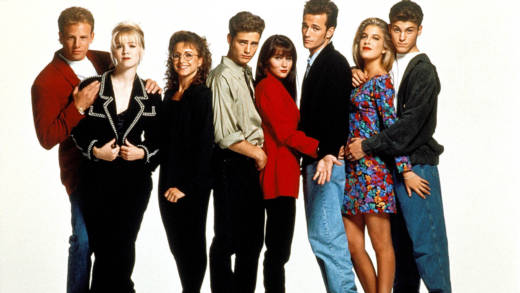It's officially summer: that heinous point in the year when so much good television evaporates and we must crawl into the depths of Netflix and Hulu to survive until winter. It is this level of desperation that recently flung me in the unlikely direction of the first season of Beverly Hills 90210.
I originally decided to revisit Brandon, Brenda, and the gang because I imagined they would unintentionally make me laugh out loud a lot. And they did -- any and all scenes involving surfing or dancing are a guaranteed laugh riot in this thing. Comedy gold also comes in the kinds of scenes that involve Brenda crashing a driver's ed vehicle because she sees Henry Winkler (why him?!), and dialogue that leaps in all kinds of absurd directions on the regular ("Janet Jackson has laryngitis! Kenny is drunk and you have to come and get me!")
I had not, however, anticipated falling into a binge-watch situation, but did because -- surprise! -- Beverly Hills 90210 is, for the most part, entirely un-ironically, a really great TV show. Obviously, we're not talking Breaking Bad levels of excellence or anything, but if we can keep My So-Called Life on a pedestal, the first season of 90210 deserves a place on the podium as well (even if the rich kid characters are inherently less likable than Rickie Vasquez and Rayanne Graff).
90210 was undoubtedly what we looked to in the pre-Kardashian age to find out how rich kids in LA lived, and for millennials, this thing is a goldmine of information about How Teenagers Used to Live. Seeing all of these hot young things trying to organize their lives while tethered to landlines, phone booths, and library desks is moderately heartbreaking in 2017, especially in the episode where the Walsh family's landline breaks and the telephone company tells them they are "lucky to have a number."


